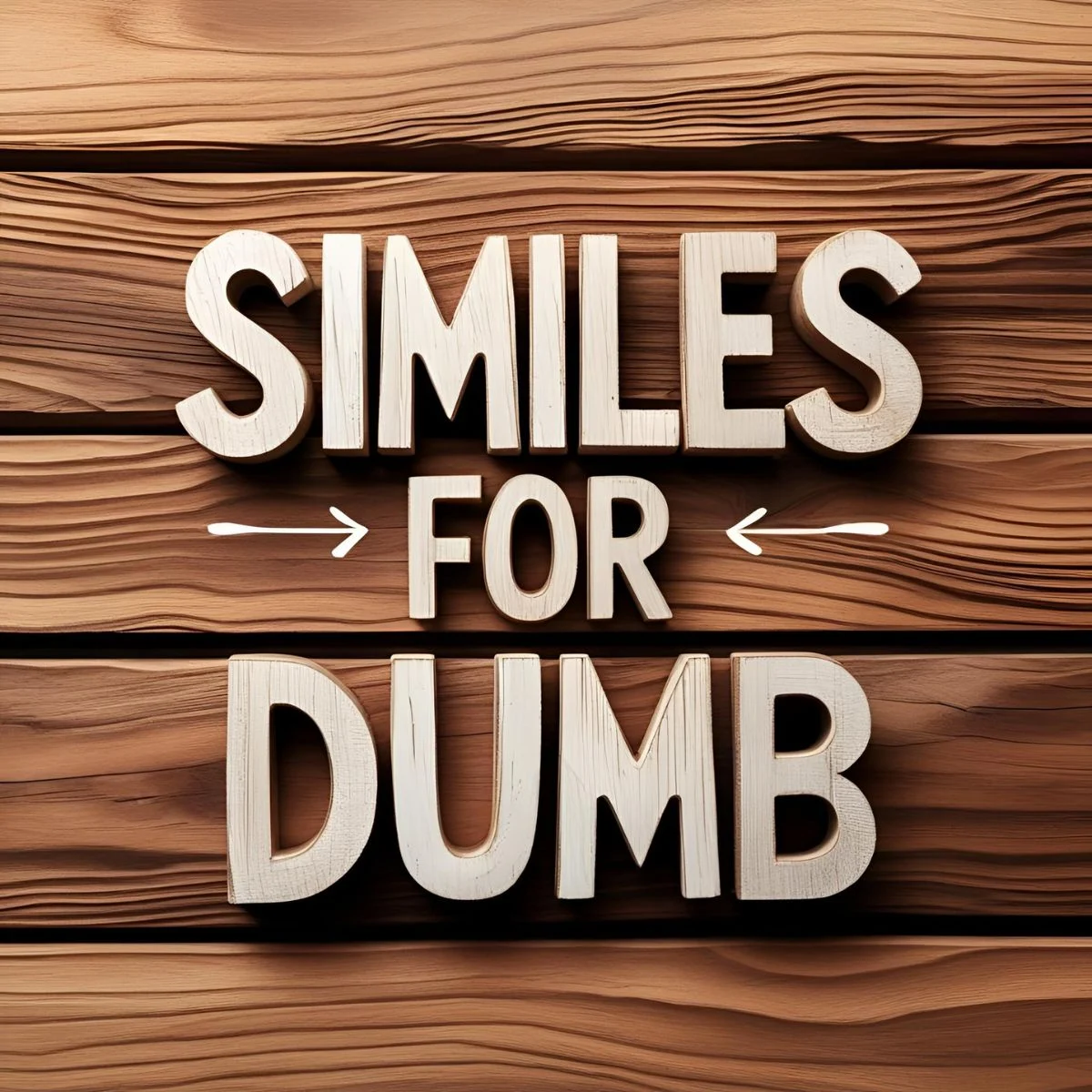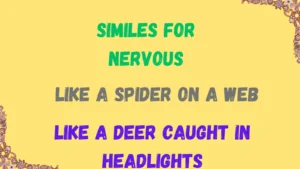The Charm of Similes in Lighthearted Language 🎭
Similes are like glitter bombs, sprinkling humor and vivid imagery onto language by comparing two unlike things with “like” or “as.” They transform plain descriptions into memorable, chuckle-worthy moments, making writing and speech more engaging. Instead of saying, “He didn’t get it,” try “He was as clueless as a goldfish in a math class!” Similes add a playful spin to describing moments of confusion or silliness, perfect for students, writers, or anyone aiming to lighten the mood. Whether in stories, banter, or social media, these comparisons make “dumb” moments shine with humor. Ready to laugh? Let’s explore 25 similes for “dumb” that capture the fun of not-so-bright moments! 🧠
Similes for Dumb: 25 Playful Comparisons
These 25 similes, grouped thematically, depict moments of confusion, oversight, or innocent cluelessness with humor and heart. Each includes a meaning, a contextual example, and a specific application for writing, speaking, or joking. From classroom blunders to social gaffes, these similes keep things light and relatable.
Dumb Moments in Learning 📚
Similes for students stumbling through academic challenges.
- Brains fog like swamps, muddling every fact.
Meaning: Confusion clouds understanding, like a swamp obscures the path.
Example: In a classroom scene, “Her brain fogged like a swamp, mixing up mitosis and meiosis.”
Application: Use in an essay about study struggles or a group chat, e.g., “My brain’s a swamp in algebra today! 🥴” - Minds drift like kites, untethered from the lesson.
Meaning: Thoughts wander aimlessly, like kites without strings.
Example: In a study group story, “His mind drifted like a kite, lost in daydreams during history.”
Application: Perfect for a blog about focus or a tweet about zoning out in class. - Ideas flop like fish, floundering on the shore of logic.
Meaning: Thoughts fail to connect, like fish out of water.
Example: In a quiz scene, “Her ideas flopped like fish, missing every chemistry question.”
Application: Use in a humorous school story or a caption about a tough test. - Thoughts scatter like marbles, rolling away from sense.
Meaning: Ideas disperse chaotically, like marbles spilling across the floor.
Example: In an exam story, “His thoughts scattered like marbles, forgetting the periodic table.”
Application: Great for a journal entry or a funny text about brain fog. - Minds are sieves, letting facts slip through the holes.
Meaning: Information escapes understanding, like water through a sieve.
Example: In a tutoring scene, “Her mind, a sieve, let the formulas slip away.”
Application: Use in a study tips blog or a Snapchat story about cramming.
Dumb Moments in Social Settings 😅
Similes for clueless blunders in conversations or friendships.
- Words tumble like clowns, tripping over simple points.
Meaning: Speech stumbles awkwardly, like clowns in a circus.
Example: In a lunchroom scene, “His words tumbled like clowns, mixing up her name in the story.”
Application: Use in a teen novel or a group chat quip, e.g., “Tumbled like a clown in that debate! 🤡” - Brains are lightbulbs, flickering with dim ideas.
Meaning: Thoughts are weak or fleeting, like a bulb struggling to shine.
Example: In a party scene, “Her brain, a flickering lightbulb, forgot the punchline.”
Application: Perfect for a comedy skit or an Instagram caption about a social slip-up. - Minds wobble like jelly, unsteady with facts.
Meaning: Understanding is shaky, like jelly wobbling on a plate.
Example: In a debate club, “His mind wobbled like jelly, fumbling the argument’s point.”
Application: Use in a speech about learning or a tweet about a shaky presentation. - Thoughts buzz like lost bees, missing the hive of logic.
Meaning: Ideas wander without direction, like bees far from home.
Example: In a group chat, “Her thoughts buzzed like lost bees, mixing up the party plans.”
Application: Great for a text thread or a blog about social mishaps. - Brains are balloons, floating above the conversation.
Meaning: Thoughts drift away from the topic, like balloons in the sky.
Example: In a team meeting, “His brain, a balloon, floated over the project details.”
Application: Use in a workplace story or a caption about zoning out in a meeting.
Dumb Moments of Oversight 🚫
Similes for missing the obvious or making silly mistakes.
- Minds are fogged windows, blurring the obvious truth.
Meaning: Clarity is obscured, like a window covered in mist.
Example: In a detective story, “Her mind, a fogged window, missed the clue right in front of her.”
Application: Use in a mystery novel or a journal about overlooking something simple. - Thoughts trip like shoelaces, tangling on easy facts.
Meaning: Ideas stumble over basics, like untied laces cause a fall.
Example: In a math class, “His thoughts tripped like shoelaces, botching the simple equation.”
Application: Perfect for a humorous essay or a tweet about a basic blunder. - Brains are compasses, spinning without direction.
Meaning: Thoughts lack focus, like a compass unable to find north.
Example: In a group project, “Her brain, a spinning compass, lost track of the deadline.”
Application: Use in a teamwork reflection or a caption about confusion. - Ideas are kites, crashing in the wind of logic.
Meaning: Thoughts fail spectacularly, like kites plummeting in a storm.
Example: In a science fair, “His ideas crashed like kites, mixing up the hypothesis.”
Application: Great for a science blog or a post about a project flop. - Minds are nets, missing the catch of common sense.
Meaning: Understanding fails to grasp basics, like a net missing fish.
Example: In a cooking class, “Her mind, a net, missed the recipe’s basic steps.”
Application: Use in a cooking story or a text about a kitchen mishap.
Dumb Moments with Heart 💖
Similes for innocent or endearing cluelessness.
- Brains are puppies, chasing their own tails in confusion.
Meaning: Thoughts loop playfully but aimlessly, like puppies in a game.
Example: In a rom-com, “His brain, a puppy, chased its tail trying to flirt with her.”
Application: Use in a lighthearted story or a Valentine’s Day card for laughs. - Minds are daisies, swaying cluelessly in the breeze.
Meaning: Thoughts are innocently unaware, like daisies in the wind.
Example: In a family scene, “Her mind, a daisy, swayed through the trivia game.”
Application: Perfect for a family blog or a caption about a fun game night. - Thoughts are bubbles, popping before they make sense.
Meaning: Ideas vanish quickly, like bubbles bursting in the air.
Example: In a brainstorming session, “His thoughts, bubbles, popped before the plan formed.”
Application: Use in a creative writing piece or a post about a failed idea. - Brains are marshmallows, soft and squishy with facts.
Meaning: Understanding is gentle but vague, like marshmallows’ texture.
Example: In a tutoring scene, “Her brain, a marshmallow, squished around the grammar rules.”
Application: Great for a tutoring blog or a funny email to a study buddy. - Minds are clouds, drifting past the point.
Meaning: Thoughts float away from relevance, like clouds in the sky.
Example: In a class discussion, “His mind, a cloud, drifted past the teacher’s question.”
Application: Use in a classroom story or a tweet about spacing out.
Dumb Moments with Cultural Flair 🌎
Similes inspired by cultural or historical imagery.
- Brains are ancient scrolls, blank on modern facts.
Meaning: Understanding lacks current knowledge, like an empty scroll.
Example: In a history class, “His brain, an ancient scroll, blanked on recent events.”
Application: Use in a historical fiction piece or a speech about learning. - Thoughts dance like jesters, stumbling through wisdom.
Meaning: Ideas are playful but clumsy, like jesters in a court.
Example: In a cultural festival, “Her thoughts danced like jesters, mixing up the dance steps.”
Application: Perfect for a cultural blog or a post about festival fun. - Minds are mosaics, missing a few key tiles.
Meaning: Understanding is incomplete, like a mosaic with gaps.
Example: In a travel story, “His mind, a mosaic, missed tiles of the local language.”
Application: Use in a travel journal or a caption about cultural mishaps. - Brains are lanterns, dim without the spark of insight.
Meaning: Thoughts lack clarity, like lanterns low on fuel.
Example: In a philosophy class, “Her brain, a dim lantern, fumbled the ethical debate.”
Application: Great for a reflective essay or a post about deep discussions. - Thoughts are alchemists, failing to turn chaos into gold.
Meaning: Ideas try but fail to make sense, like alchemists missing the mark.
Example: In a science project, “His thoughts, alchemists, failed to turn data into answers.”
Application: Use in a science blog or a caption for a project gone awry.
Creative Examples to Spark Giggles 😄
These similes turn “Stupid” moments into comedy gold. “Brains are puppies” paints a lovable picture of confusion, perfect for a rom-com’s awkward hero. “Thoughts trip like shoelaces” captures a relatable classroom blunder, ideal for a vlog about school life. Ever felt your mind was a “fogged window” during a meeting? Try it in a funny email! Which simile cracks you up—do you scatter like marbles or wobble like jelly?
Try This: Pick a simile and write a sentence about a silly moment today, like “My brain was a marshmallow in math class! 🍬” Share it in a text or journal.
Practical Applications for Every Voice ✍️
These similes can add humor to your work or chats:
- Essays: Use “minds drift like kites” in a personal essay, e.g., “My mind drifted like a kite during that lecture.”
- Stories: Add “words tumble like clowns” to a teen novel for a funny dialogue scene.
- Speeches: Say “We’re all marshmallows sometimes, learning with heart” in a class speech to connect with peers.
- Social Media: Post “Thoughts buzzing like lost bees in this group project! 🐝” for a relatable laugh.
- Class Banter: Toss “I’m a sieve, facts slipping through!” into a study group chat for giggles.
Challenge: Rewrite a dull sentence from your day with a simile, like “I was confused” to “My brain was a cloud, drifting past the point.” See how it adds zing!
Conclusion: Embrace the Fun of Similes 🎉
Similes are your secret weapon for turning “uninformed” moments into laugh-out-loud stories. From “puppies” chasing clueless thoughts to “jesters” dancing through facts, these comparisons make writing, speeches, and chats unforgettable. So, grab a simile and sprinkle it into your next essay, tweet, or joke—maybe “My brain’s a fogged window today!” Better yet, create your own: are your thoughts “popcorn, bouncing without a plan”? Share it with a friend or post it online to spread the smiles. Life’s a stage, and similes are your spotlight—let the laughter shine! 🌟



